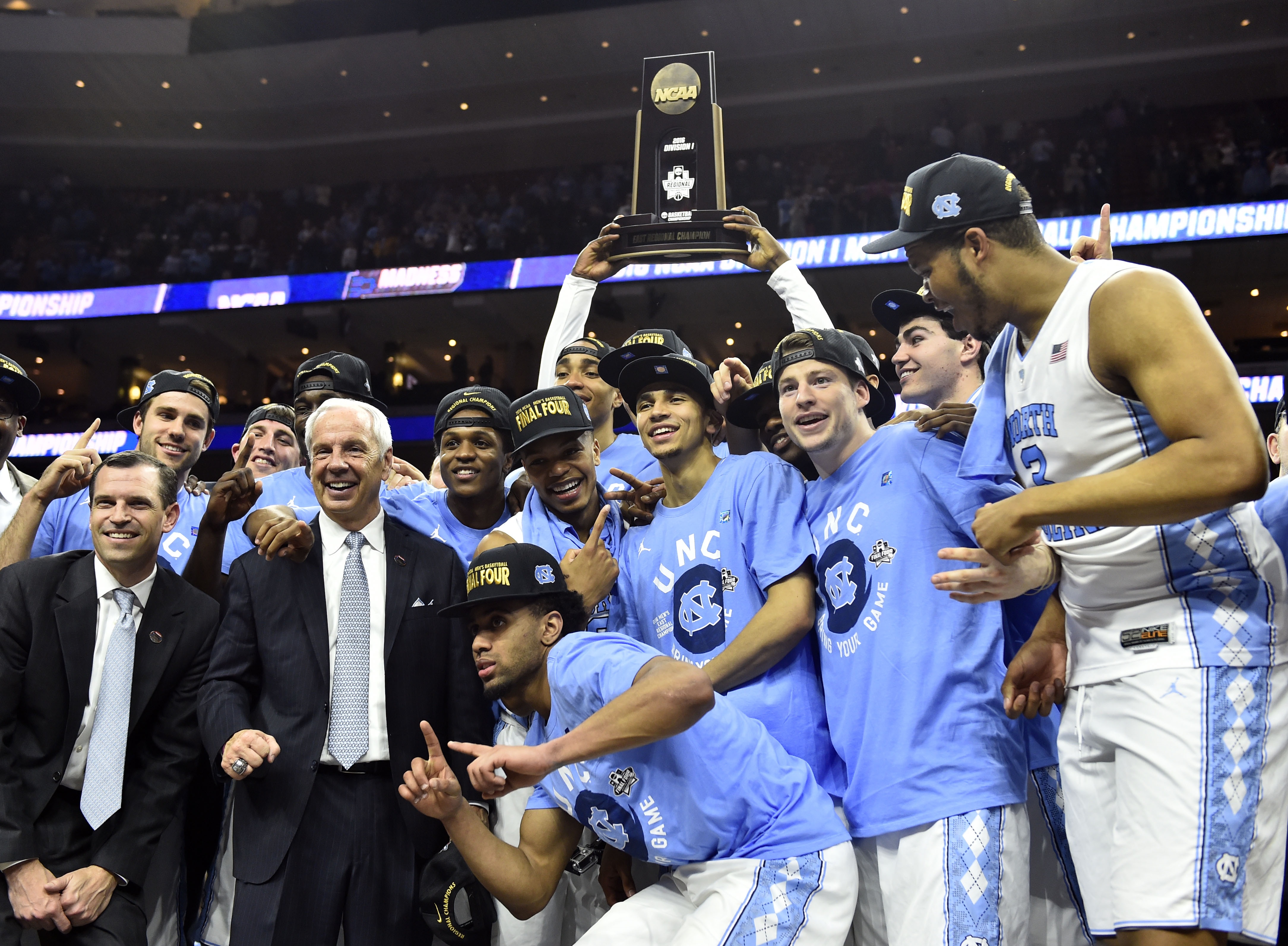HOUSTON — Kudos to the NCAA for hosting a tap dancing exhibition along with the Final Four.
Syracuse coach Jim Boeheim wants you to know that cheating and breaking rules aren’t the same, no matter what Webster’s and common sense tell you. In one breath, NCAA President Mark Emmert praises the deterrent effect of postseason bans and in the very next defends Syracuse and North Carolina’s right to bring their dirty laundry to college basketball’s showcase event.
Then, of course, there are all those references to “the student-athlete,” a term designed to protect the NCAA from having to hand over some of its billions to the kids who are bringing it in.
![Jim Boeheim defines 'rules being broken' as different than cheating [oembed : 82492312] [oembed : 82492312] [oembed : 82492312] [oembed : 82492312] [oembed : 82492312] [oembed : 82492312] [oembed : 82492312] [oembed : 82492312] [oembed : 82492312] [oembed : 82492312] [oembed : 82492312] [oembed : 82492312]](/Portals/_default/Skins/PrestoLegacy/CommonCss/images/smartembed.png)
No matter what high-minded ideals they profess, the main concern of everyone in the NCAA — be it Emmert, university presidents and athletic directors, or coaches — is to protect the status quo.
And by status quo I mean cash, because that’s what it always comes back to.
The NCAA had revenues of $912 million in fiscal year 2015 thanks to the popularity of events like the Final Four, where companies are tripping over themselves to get a piece of the action. The TV contract alone for the NCAA tournament is worth $10.8 billion over 14 years, and AT&T, Capital One and Allstate are just a few of the other companies happy to write big checks to the NCAA.
There’s even a sponsor for the ladders — yes, the ladders — that players climb to cut down the nets.
![Grant Hill and Tracy Wolfson: 360 degree look at the Final Four Friday [oembed : 82541446] [oembed : 82541446]](/Portals/_default/Skins/PrestoLegacy/CommonCss/images/smartembed.png)
It’s not just the NCAA that’s flush with cash, either. A USA TODAY Sports survey of the coaches in this year’s tournament, published Wednesday, found that 24 are making at least $2 million, up from 11 just five years ago. Five made $4 million or more this season.
The players, meanwhile, are living large. For two years now, all “student-athletes” have had access to unlimited meals and snacks. Yippee! They get all the M&Ms they can eat while their coaches get Mercedes-Benzes.
“The resources that are being committed to student-athletes, and the opportunities they have to enjoy those resources, are significantly greater today than they were six years ago,” Emmert said Thursday in his annual state of the association.
“In fact, I would clearly contend that student-athletes right now are in a much stronger, more successful position than they were in that short time. That's a very, very good thing.”
There are plenty of “student-athletes” who would disagree with him, starting with Ed O’Bannon and the other plaintiffs in the antitrust lawsuit over the use of their images. But hypocrisy has never much bothered the NCAA.
Syracuse was banned from the postseason last year and Boeheim suspended for nine games earlier this season for a series of violations. The NCAA spent eight years investigating Syracuse, eventually finding that a basketball staffer had done coursework to keep a player eligible; the school had ignored or violated its own drug testing program; and that a booster had provided more than $8,000 in extra benefits.
![Armour: After season of chaos, don't expect order in Final Four, either [oembed : 82492380] [oembed : 82492380] [oembed : 82492380] [oembed : 82492380] [oembed : 82492380] [oembed : 82492380] [oembed : 82492380] [oembed : 82492380] [oembed : 82492380] [oembed : 82492380] [oembed : 82492380] [oembed : 82492380]](/Portals/_default/Skins/PrestoLegacy/CommonCss/images/smartembed.png)
Though Boeheim was not complicit in any of the violations, the NCAA found he hadn’t promoted an “atmosphere of compliance.”
Serious stuff. Yet here the Orange are, two wins away from climbing those sponsored ladders as national champions.
If this sounds familiar, it is. Connecticut was banned from the postseason in 2013 for not meeting required academic standards. A year later, it won the national title.
Ohio State’s football team was banned from bowl games after the 2012 season for the tattoo scandal that cost Jim Tressel his job. Two years later, the Buckeyes won the first College Football Playoff.
![Three-point shooting at NRG can be tricky: Who has the advantage? [oembed : 82492358] [oembed : 82492358] [oembed : 82492358] [oembed : 82492358] [oembed : 82492358] [oembed : 82492358] [oembed : 82492358] [oembed : 82492358] [oembed : 82492358] [oembed : 82492358] [oembed : 82492358] [oembed : 82492358]](/Portals/_default/Skins/PrestoLegacy/CommonCss/images/smartembed.png)
There’s something about schools being allowed to reap big rewards after recovering from what is little more than a slap on the wrist that seems at odds with what the NCAA is supposed to promote. You know, fair play, the benefits of competition, life lessons about the value of hard work and perseverance.
In the NCAA bubble, however, it’s all hunky dory.
“I understand why optically people have a lot of questions around all that. It makes perfect sense that they might,” Emmert said.
“The university dealt with those sanctions, and this group of young men that are playing right now had nothing to do with any of those violations,” he added. “… It shouldn't impact these young men. That's what the judgment of the membership was. I support it.”
Of course. Because the bottom line isn’t teaching young people about the consequences of bad behavior, or that the punishment for guilt by association can be severe. It’s about protecting the very lucrative product, and nobody does that better than the NCAA.
Follow columnist Nancy Armour on Twitter @nrarmour
SCENES FROM THE FINAL FOUR IN HOUSTON


![2016-3-31 mark emmert [image : 82487928]](http://www.gannett-cdn.com/-mm-/3b0926693cd66b0e6f3886fcea5cc0fd715d8269/c=66-0-2193-1818/local/-/media/2016/03/31/USATODAY/USATODAY/635950448305101788-USP-NCAA-BASKETBALL-NCAA-BASKETBALL-FINAL-FOUR-M-80887232.JPG)
![USP NCAA BASKETBALL: NCAA BASKETBALL: FINAL FOUR-M S BKC USA TX [image : 82492454]](http://www.gannett-cdn.com/media/2016/03/31/USATODAY/USATODAY/635950504670679520-USP-NCAA-BASKETBALL-NCAA-BASKETBALL-FINAL-FOUR-M-80886780.JPG)
![Scenes from the Final Four in Houston [gallery : 82489746]](http://www.gannett-cdn.com/-mm-/396f988cb228c3c5d280d486f8286129f5d3e1c3/c=837-0-4649-3258/local/-/media/2016/03/31/USATODAY/USATODAY/635950496580623661-AP-NCAA-FINAL-FOUR-BASKETBALL-80883272.JPG)
